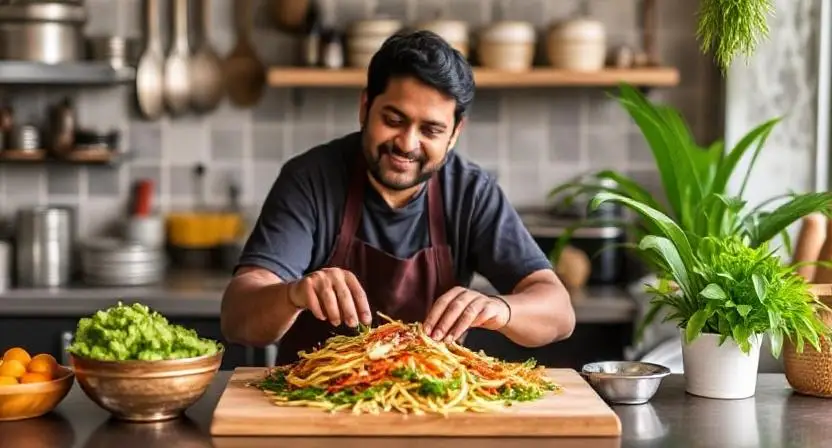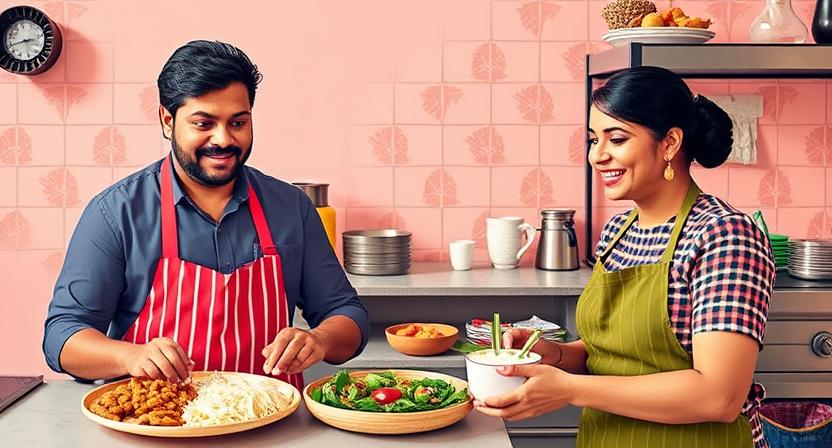India’s culinary start-up scene is booming. Today, Indian foodpreneurs—especially emerging women foodpreneurs in India—are redefining innovation in the start-up food India ecosystem.
India’s culinary landscape is in the middle of a delicious transformation. The humble home kitchen is no longer just a place to cook—it has become an incubator for innovation, creativity, and entrepreneurship.
Unlike the past decade’s rush toward tech or fintech start-ups, the 2020s have seen the Food & Beverage (F&B) space emerge as one of India’s hottest entrepreneurial playgrounds. Driven by digital reach, changing lifestyles, and consumer curiosity, these founders aren’t merely feeding appetites—they’re feeding India’s economic growth and cultural pride.
Table of Content
- 🍛 The Growth of Food Start-ups in India
- 🌾 Case Studies: Four Foodpreneurs Who Changed the Menu
- 1️⃣ The Whole Truth Foods – “Ingredients You Can Trust”
- 2️⃣ Samosa Singh – “Scaling a Snack Icon”
- 3️⃣ Blue Tribe Foods – “Plant-Based Revolution”
- 🚧 Challenges Indian Foodpreneurs Face
- 💡 Strategy Tips for Emerging Foodpreneurs
- 🧠 What Big Brands Can Learn from Foodpreneurs
- 📈 The Next Wave: Tech Meets Taste
- 🚀 Conclusion: Building the Future of Food
- 🔗 External Reference
🍛 The Growth of Food Start-ups in India
The Indian food-start-up ecosystem has matured dramatically in just five years. According to FSSAI and Start-Up India data (2024-25), there are now over 10,000 registered food-sector start-ups, spanning packaged goods, quick-service restaurants, online delivery, and sustainable farming.
🔹 Key Growth Drivers
- Digital Delivery Platforms: Swiggy, Zomato, and Blinkit have opened new pathways for small players to reach mass audiences overnight.
- Changing Consumer Lifestyles: Urban India’s shift toward convenience, nutrition, and experimentation fuels demand for unique concepts—plant-based snacks, millet-based desserts, or regionally authentic condiments.
- Government Support: Initiatives such as the PM-FME Scheme and Startup India Seed Fund are creating micro-enterprise opportunities for local producers.
- Rise of Conscious Consumption: Health-conscious consumers are reading ingredient labels, researching origin stories, and rewarding brands that prioritize transparency.
🌾 Case Studies: Four Foodpreneurs Who Changed the Menu
1️⃣ The Whole Truth Foods – “Ingredients You Can Trust”
- Founded in 2019 by Shashank Mehta.
- The brand’s mission: clean-label snacks with transparency in ingredients, rejecting hidden additives.
- Lesson: Transparency + integrity can be distinctive advantages in a crowded food market.
2️⃣ Samosa Singh – “Scaling a Snack Icon”
- A start-up in Bengaluru by Nidhi Singh & Shikhar Veer Singh, who left corporate jobs to build the brand.
- Their innovation: re-thinking the humble samosa with increased hygiene, modern branding, and wider reach.
- Lesson: A well-loved traditional snack can become a growth engine when combined with modern design, operations, and scale.
3️⃣ Blue Tribe Foods – “Plant-Based Revolution”
- Founded around 2019/2020 by Sandeep Singh & Nikki Arora Singh in Mumbai.
- Backed by celebrities like Virat Kohli & Anushka Sharma, with a focus on plant-based meat alternatives.
- Lesson: Sustainability isn’t a side story anymore—it’s a mainstream business proposition.
These women foodpreneurs India have proved that passion and process can build sustainable start-up foodventures with global potential.

🚧 Challenges Indian Foodpreneurs Face
Even as opportunities expand, food-sector entrepreneurs navigate a complex terrain of compliance, logistics, and consumer psychology.
- Regulatory Hurdles: FSSAI licensing, labeling norms, and periodic audits can be overwhelming for first-time founders.
- Cold-Chain & Logistics: Fresh products require temperature control; one failed shipment can wipe out profits.
- Capital Crunch: Food businesses often need heavy working capital for inventory and distribution, yet many VCs still favor pure-tech models.
- Talent Gap: Culinary innovation requires trained chefs, food technologists, and supply-chain experts—talent is still scarce outside metros.
- Brand Trust: Unlike software, food is intimate; one negative review about hygiene can permanently damage a reputation.
💡 Strategy Tips for Emerging Foodpreneurs
1. Start Local Before Global. Test the product within your city or a focused demographic. A loyal local base provides invaluable feedback.
2. Invest in Packaging & Storytelling. In F&B, the first sale happens visually. Sustainable packaging with a relatable brand story builds repeat customers.
3. Digitize Early. Use social media analytics, food delivery dashboards, and CRM tools to track consumer trends and engagement.
4. Build Community. Host tasting events, collaborate with nutritionists or food bloggers, and convert early customers into ambassadors.
5. Prioritize Compliance. A strong FSSAI record, transparent ingredient lists, and HACCP certification give long-term credibility.
6. Collaborate Instead of Competing. Many successful founders co-manufacture or share logistics networks to reduce costs.
🧠 What Big Brands Can Learn from Foodpreneurs
Large FMCG corporations are now studying start-ups for agility and authenticity. The “fail-fast & pivot” mindset of small founders enables faster product innovation than corporate R&D pipelines.
- Authentic Brand Voices: Consumers prefer real stories over celebrity endorsements.
- Localized Menus: Start-ups tailor menus to regional tastes—something global chains often miss.
- Digital Engagement: Start-ups respond instantly to feedback; corporates can emulate that agility.
In fact, partnerships are already forming—Hindustan Unilever’s investment in Oziva (Nutrition Start-up) and ITC’s backing of Yoga Bar prove that synergy is the future.
📈 The Next Wave: Tech Meets Taste
The next era of Indian food entrepreneurship will blend AI, IoT, and sustainability. Cloud kitchens are already using predictive analytics to minimize waste; farms are adopting smart irrigation; even home chefs use Instagram AI tools for menu planning.
Trend Forecast for 2025 and Beyond:
- Millet Revolution 2.0: UN declared 2023 the International Year of Millets; momentum continues through 2025.
- Functional Foods: Probiotic drinks, adaptogenic teas, collagen-based desserts.
- Hyperlocal Ingredients: Turmeric lattes and jackfruit tacos go global.
- Ghost Brands: More micro-brands will operate from shared kitchens for specific cuisines.
🚀 Conclusion: Building the Future of Food
The rise of Indian foodpreneurs reflects the broader growth of start-up food brands in India — ventures driven by purpose, transparency, and local heritage. These entrepreneurs are storytellers of flavour, culture, and innovation. Their journey shows that entrepreneurship in India is no longer confined to coding or capital markets; it’s now simmering in the kitchens of small towns and metro cafés alike.
To those dreaming of launching their own food brand: start simple, stay authentic, and build community before chasing scale.
See more entrepreneur stories here
🔗 External Reference
India’s food processing sector projected to reach $535 bn by FY26 end
Food Business Ideas in India for 2025: How to Start a Food Business?


